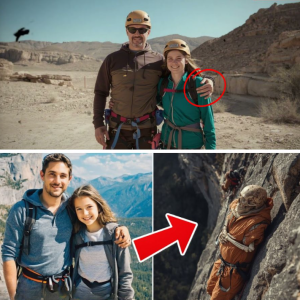Sometimes the Mountain Doesn’t Take Lives with a Roar — It Just Swallows Them Whole
Sometimes the mountain doesn’t take lives with a roar of wind and a crash of rock. It just swallows them whole, leaving behind a silence so vast it feels like it will last forever.
Mountains are ancient things — patient, unmoving, and yet always shifting beneath their frozen calm. They are monuments of time itself, shaped by the earth’s deep breath and the slow grinding of stone against stone. To those who climb them, they are both adversary and altar, a place where courage and fear meet in the thin air above the world. But sometimes, the mountain doesn’t need to unleash an avalanche or a storm to claim a life. Sometimes, it simply opens a crack, moves a breath, and the world changes forever.
It happens quietly. A group of climbers begins their ascent before dawn, headlamps cutting through the icy dark. The air is thin, the wind almost still. Each step crunches softly in the snow. They speak little — partly because of the altitude, partly out of reverence. The mountain looms above, a silhouette of shadow and ice. There is beauty in its stillness, and danger in its silence.
Hours later, as the sun rises, painting the peaks in gold, the silence deepens. One climber stops to adjust his rope, another checks her pack. The mountain waits. Then, without warning — without any thunder, without any sound — the snow shifts beneath one of them. A crevasse opens, invisible until that very moment. A hollow space beneath what looked solid. And in an instant, the climber is gone.
No scream. No echo. Just an absence where a person was standing seconds before.
The others rush forward, shouting his name, their voices breaking against the mountain’s indifferent walls. They anchor ropes, peer into the shadowed void. But it’s deep — too deep — and all they can see is blue ice fading into darkness. There is no movement, no response, only the faint sound of wind beginning to stir, as if the mountain itself exhales after taking a life.
This is how mountains often claim their due — not through rage, but through quiet. Through stillness. Through the illusion of safety that turns, in an instant, into eternity.
For those left behind, that silence becomes unbearable. It follows them down the mountain, into the base camp, into the long nights after they return home. It hums in the background of every memory — the laughter at breakfast, the shared stories, the confidence in each other’s steps. The silence becomes its own kind of ghost.
To outsiders, such accidents are often reduced to statistics — “a climber lost,” “a fall into a crevasse,” “missing, presumed dead.” But to those who’ve stood on a mountain and felt the air vibrate with that deep, impossible quiet, it’s more than a number. It’s a reminder that the mountain is alive in a way we rarely understand. It moves at its own pace, speaks its own language, and demands respect not through noise, but through awe.
There’s something deeply human about the urge to climb. We look at great heights and feel called upward, drawn by curiosity, ambition, or the need to prove that we can. But every climber knows — whether they admit it or not — that the mountain never really belongs to them. They borrow it for a while, step upon its skin, and hope it allows them to return.
Sometimes it doesn’t.
And when it doesn’t, there are no answers — only stories left behind.
The friends of the vanished climber return in the spring when the ice begins to melt. They trace the route again, quietly, stopping where the snow had given way. There’s a new overhang now, the mountain reshaped by winter. They call out his name once more, though they know it’s hopeless. Some of them say they can still feel him there — not trapped, not suffering, but absorbed into the mountain itself. It’s an old belief, one found in cultures around the world: that the spirits of those lost to the heights remain there, watching over the living.
In Nepal, the Sherpa people speak of the mountain spirits, guardians who dwell in the high places. In the Andes, climbers offer gifts of coca leaves and tobacco before beginning their ascent, asking permission to pass safely. In the Alps, villagers once left bread and milk at the base of peaks, believing it would appease the “old ones” that lived within the stone. Across all these traditions, one truth remains — the mountain is not conquered. It is communed with.
The silence left by those who vanish in the heights becomes part of the mountain’s story. It’s not just emptiness — it’s memory. Every gust of wind, every crack of ice, carries a whisper of the lives that were once there. And somehow, knowing that brings comfort.
For those who survive, the mountain’s silence teaches humility. It reminds them that control is an illusion. You can train for months, plan every route, check every knot, and still — a moment of stillness can take everything. It’s not cruelty; it’s nature’s way of reminding us how small we are.
When they descend, they carry that silence inside them. It changes how they see the world below — the noise of cities, the rush of life, the constant need for more. The mountain teaches patience, reverence, and the power of stillness. It shows that sometimes, the loudest truths are whispered in the quietest places.
Years pass. The friends of the fallen climber continue their journeys. They climb other peaks, cross other passes. But every time they step onto snow, they feel the same hush — that moment when everything around them holds its breath. Some call it fear, others call it peace. It’s the same silence that once swallowed their friend, and in that stillness, they feel both loss and connection.
Because perhaps the mountain doesn’t just take. Perhaps it keeps.
Perhaps those who vanish into its depths become part of its eternal rhythm — the creak of glaciers, the shifting of snow, the soft rumble of rock deep underground. The silence that feels endless isn’t empty at all. It’s full of the echoes of those who came before, of the courage, the wonder, and the fragile beauty of being human in the face of something vast and ancient.
So when we say the mountain “swallowed them whole,” it isn’t a punishment or an act of cruelty. It’s a merging — a return. The mountain, in its quiet way, reminds us that all things, no matter how brave or strong, eventually belong to the earth again.

